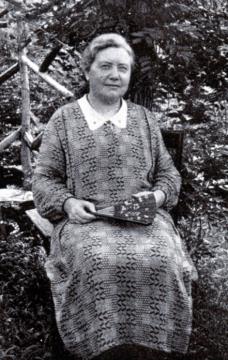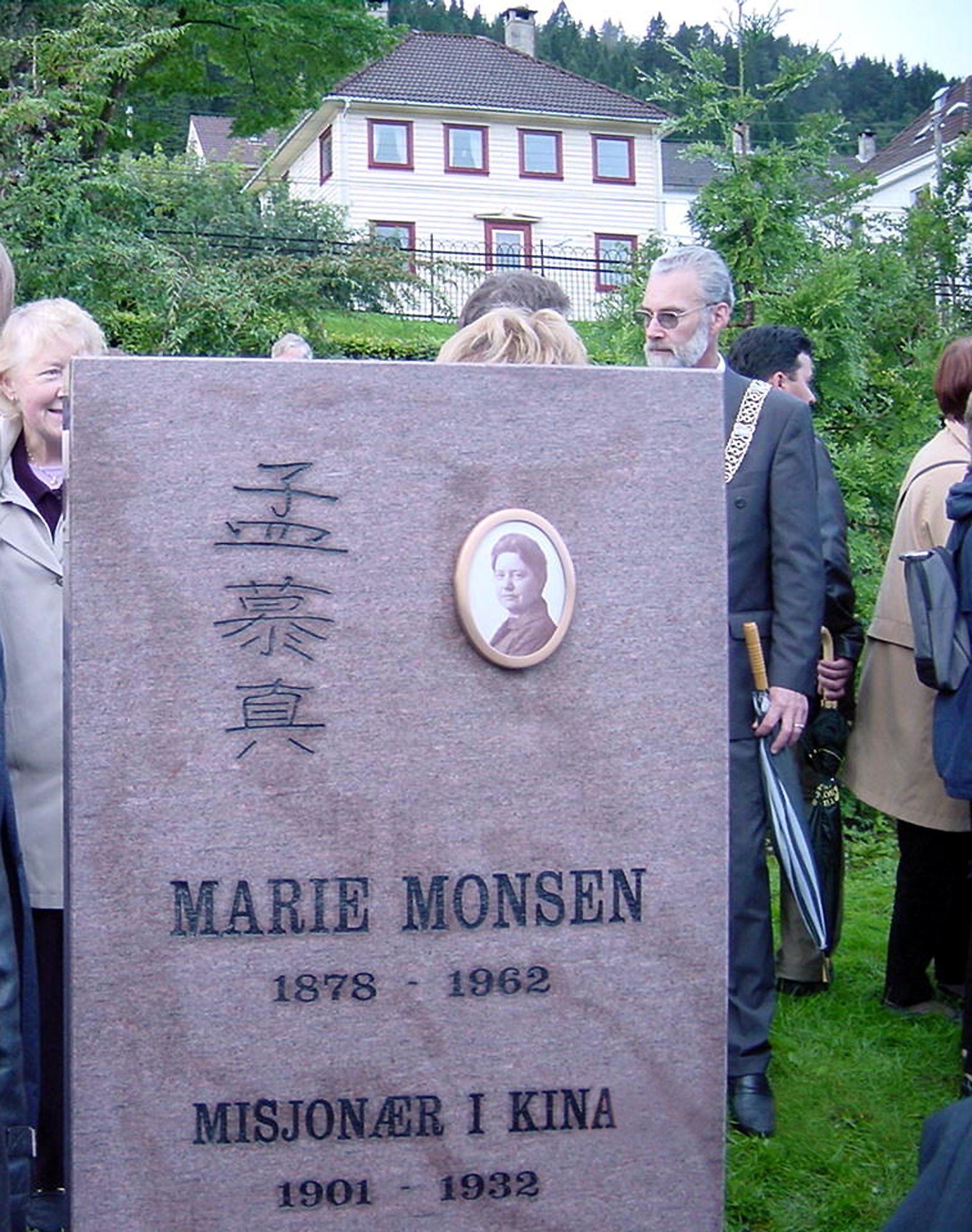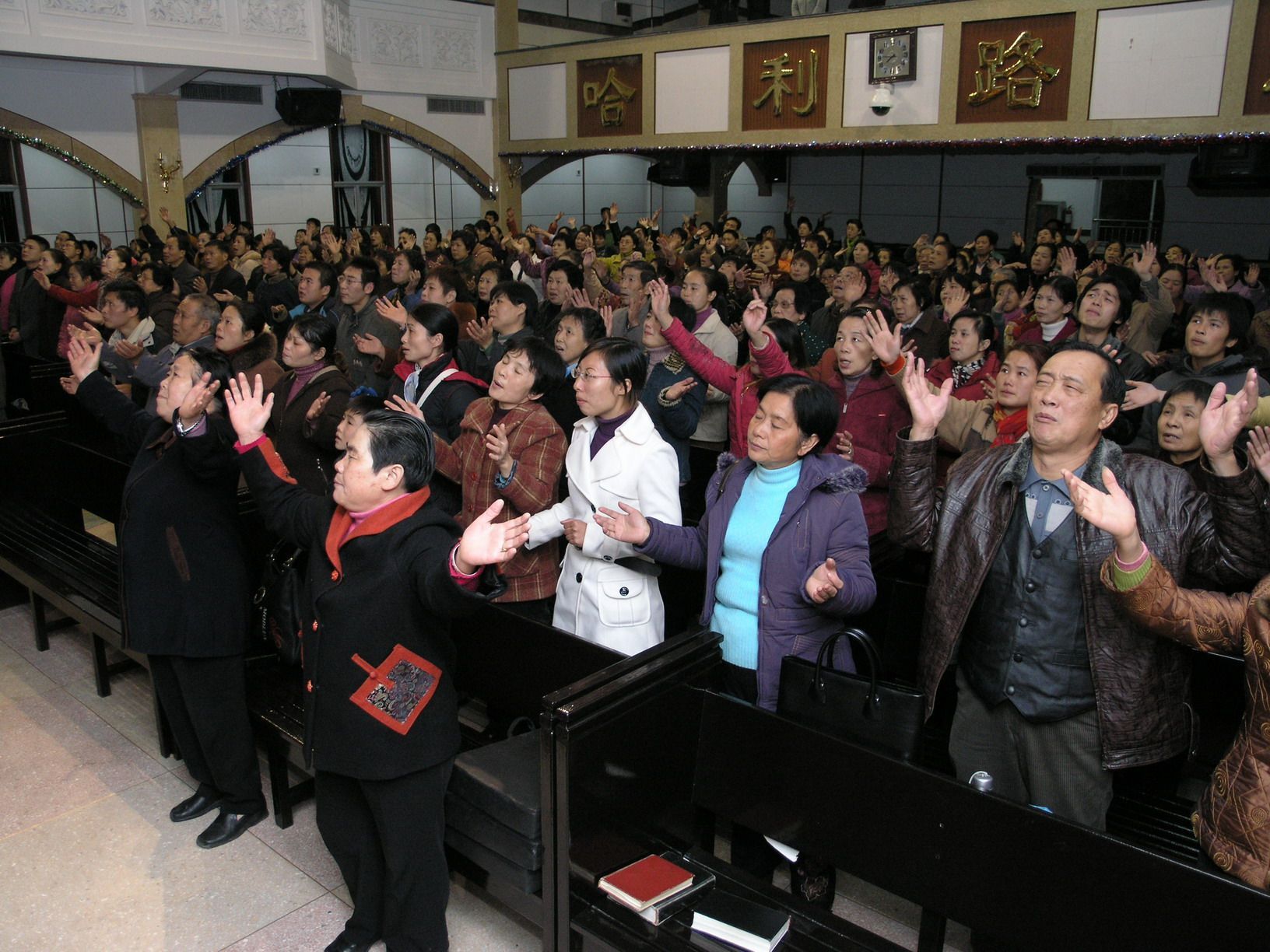Marie Monsen (1878 - 1962)

Marie Monsen
One of the most beloved foreign missionaries to ever serve in China was Marie Monsen, a single woman from Norway, whose unassuming appearance belied a spiritual giant within. Although most of her ministry occurred further south in Henan Province—where many Christians still fondly refer to her as 'the mother of the house churches'— Monsen also spent considerable time in Shandong, where she was a catalyst for revival.
Having arrived in China in 1901, aged 23, Monsen led a relatively quiet life as a Lutheran missionary until the 1920s, when her bold and uncompromising messages began to stir the Body of Christ and cleanse it in preparation for an outpouring of God's power. The genesis of the Shandong revival that swept a great multitude of people into God's kingdom in the 1930s is often believed to have started with a series of preparatory meetings Monsen held throughout the province in 1927. One historian recounted the impact those meetings had on the Church in Shandong:
"She visited mission stations and churches giving her testimony. After each service she greeted the Chinese and missionaries alike with the probing question, 'Have you been born again?' The question insulted some and angered others. But she spared no one, asking preachers, deacons, missionaries and others the same question. When their anger subsided, the Holy Spirit began to search hearts. People discovered and admitted they had not been born again."1
One missionary, who was wary of the 'sensationalism' that often accompanied revival meetings, carefully studied Monsen and the fruit of her meetings. He wrote, "Miss Monsen herself is one of the quietest speakers I ever heard. There was very poor singing and no invitation for public decisions, only the quiet question, 'Have you been born again?' Were it not for a wonderful spirit of prayer and an occasional testimony, no unknowing visitor would believe we were in the midst of a revival."2
Marie Monsen came from a conservative church background, and was averse to allowing what today would be described as 'hype' in the meetings. She was careful not to place pressure or manipulate people with her words, and she
"constantly warned others against 'picking unripe fruit'. That could only produce spurious results, which were not the work of the Holy Spirit. But when people became aware of their sins, their responses would inevitably be accompanied by emotion, and sometimes by tears for what they had done. Then, as they appreciated God's love, mercy and forgiveness, and His welcome for those who trusted in what Jesus had done for them, many also experienced overwhelming relief and joy. In the old Chinese religions many people spent years obsessively fasting, making long pilgrimages and doing penances. They had lived their lives in bondage trying to earn forgiveness, and now the good news of Jesus had set them free. They had something to rejoice about."3
As the Spirit of God moved in Marie Monsen's meetings throughout Shandong, demonstrations of His matchless power emerged. In one service a Chinese Christian worker "tried to deceive himself and others by insisting he was saved. However, he could not deceive the Holy Spirit. One night this healthy young man was suddenly struck down in the courtyard and had to be carried in. He was stiff, blue, and cold. Concerned friends knelt at his side, praying. The missionary urged him to confess his sins quickly. As soon as he could open his mouth, he confessed and stood upon his feet again, forgiven."4
Captive at Sea
One of the most famous stories involving Marie Monsen occurred in July 1929, when the ship she boarded en route to a conference in Shandong was hijacked by pirates. Monsen told the events of her 23-day captivity in a book, entitled We are Escaped, which was published two years later.5
Monsen's life was characterized by her dependence on the Holy Spirit and her determination to obey His leading. In the providence of God, she was impressed to take a boat that sailed one day earlier than she had planned. She was also led to buy several boxes of apples before departure, for no apparent reason. Furthermore, in the months leading up to the incident she had unexpectedly received several boxes of chocolate in the mail from supporters back home. Each time she thought of giving the chocolate away, Monsen heard the still, small voice of the Holy Spirit tell her, "Keep it for an emergency."
The morning after the ship left Tianjin, as it neared the Shandong coast, a band of about 20 armed robbers boarded the vessel and took control. Monsen remained in her cabin as she heard shots ring out all over the ship. She later wrote, "I was immediately reminded of the word that I had been using much in years gone by, based on Isaiah 41:10: 'Fear not, Marie, for I am with thee. Be not dismayed, Marie, for I am thy God. I will strengthen thee, Marie, with the right hand of my righteousness. Fear not, Marie.'"6
When all the passengers were ordered to leave their cabins and assemble on the deck, Monsen refused to do so under the prompting of God's Spirit. She remained on her bed, singing hymns and quoting Scripture out loud.
When a young pirate entered her cabin and demanded she hand over her watch, the bold missionary refused to oblige. When he pointed a gun at her and threatened to shoot, Marie told the man, "Oh no, you cannot shoot me. You cannot shoot me whenever you like. My God says that no weapon formed against me shall prosper. You cannot use your pistol whenever you like and shoot me. You must have special permission from the Living God to do that."7
Several times the agitated man threatened to shoot, and each time Monsen calmly quoted the Bible to him. Over the course of the next three weeks she often heard the man repeating those words to himself.
On another occasion a different ruffian pushed his way into her cabin. Monsen said that it felt like
"The devil himself was there. The man's face and neck and hands were all covered with hideous open sores. He sat down on my suitcase, almost breathing in my face.... I claimed the promise that God would be like a wall of fire round about me, and that vile man sitting there was up against the wall before he could touch me."8
The missionary talked to the man for an hour, sharing the gospel with him and ministering to him. He said he knew some real Christians in his home area, and when he left her cabin he had tears in his eyes.
For the next week the pirates looted every boat they came across at sea, until they had a dozen vessels under their command. Another ship with 50 or 60 more robbers joined them in their merciless plunder.
The whole time, Monsen refused to come to the dining room to eat any of the stolen food offered to her by the gang. They thought she was staging a hunger-strike and were concerned for her well-being, not knowing she was enjoying the apples and boxes of chocolate the Lord had unexpectedly provided His servant.
Every day as they were eating their meals, Monsen handed out gospel tracts to the pirates. One would read aloud while the others listened intently. She frequently saw tears welling up in the men's eyes.
Finally, after more than three weeks at sea, the pirates decided to part with their loot the following morning, after learning the Chinese navy was on its way to confront them. Monsen overheard the men discuss how to carry her off the ship, as they desired to hold her hostage to aid their escape. One of the leaders then said, "What's the use of carrying the foreigner with us? She hasn't eaten anything for 23 days. She won't be able to run or walk. You see the circumstances we are in. Leave her behind!"9
After the pirates left the ship, the other passengers crowded around Marie and asked for gospel tracts. They said, "We have seen that your God is the true God, and we want to believe in Him too."
A few years after her experience as a captive at sea, Monsen returned to Shandong to conduct revival meetings. After ministering at Jinan, a local missionary reported, "People were broken up and wept for their sins. There were then special manifestations of the Spirit's power and great rejoicing.... Missionaries, pastors and others, willing formerly to work only as average Christians, became dissatisfied, placed themselves on the altar anew, were filled with the Spirit, and now see the Lord in a different way."10
Partly due to the godly influence of Marie Monsen and other servants of the gospel, Jinan to this day remains the part of Shandong with the highest percentage of Christians.
In 1932 Monsen surprised many when she decided to leave China and return to Norway to take care of her elderly mother. She was 54-years-old at the time and had lived the last 31 years of her life in China. While some were shocked that her missionary career came to an abrupt end at a time when her ministry was bearing much fruit, no one who knew her doubted that this maidservant of the Lord had sought and obeyed the voice of the Holy Spirit.
Marie Monsen's long and fruitful ministry in China was later summarized with this glowing tribute:
"Blessing came to large numbers of Christian leaders, both Chinese and missionaries. Those who had seen little response to the Christian message had been discouraged by apathy, feeling God had abandoned them. Some had lapsed into doubt; others had tolerated sin in their attitudes and relationships. Now they had a new experience of the power of God. The message was as old as the New Testament, but as Marie talked to individuals, she found that many 'Christians' had failed to have a real understanding of the work of Jesus.
For over 20 years, large numbers had been entering the churches, but too often the preaching had been vague, calling people to 'believe' without explaining what and why. One missionary had assumed that she became a Christian as a child when she raised her hand at a meeting, without understanding what it signified. Others had become Christians without an inward understanding of what God had done for them.
When people realized in their hearts what they had believed theoretically with their heads, their love for God deepened and led to great joy."11
In Marie Monsen's place, God surprised many by raising up another Scandinavian woman, the younger Anna Christensen of Denmark, who took over much of the ministry Monsen had left behind. Christensen had a remarkable ministry of evangelism in all of China's provinces, until she was forced to leave China at the advent of Communism.
Marie Monsen passed away in 1962 at the age of 84, and is buried in a cemetery in the Norwegian city of Bergen.

Marie Monsen's memorial stone, erected in 1999.
© This article is an extract from Paul Hattaway's book 'Shandong: The Revival Province'. You can order this or any of The China Chronicles books and e-books from our online bookstore.
1. Culpepper, The Shantung Revival, p. 19.
2. Culpepper, The Shantung Revival, p. 19.
3. Griffiths, Not Less than Everything, p. 261.
4. Culpepper, The Shantung Revival, p. 23.
5. F. Strauss; H.D. Hayward; & M. Monsen, We are Escaped (London: China Inland Mission, 1931).
6. Carlberg, China in Revival, p. 77.
7. Carlberg, China in Revival, p. 78.
8. Carlberg, China in Revival, p. 80.
9. Carlberg, China in Revival, p. 82.
10. Carlberg, China in Revival, p. 120.
11. Griffiths, Not Less than Everything, p. 257.





